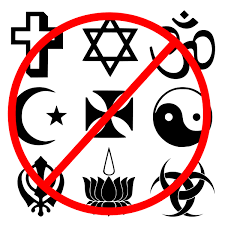The question regarding the difference between these two non-religious worldviews is a complex question and in practice the two terms don’t even need to be mutually exclusive. The term atheism originated Greek word “atheos” which means “without gods” and was a negative term that applied to anyone who rejected the gods of the state. Originally this term was even used against early Christians for their rejection of the classical gods of Greece and Rome.
While there were individuals and movements who today we would think of as atheists such as the Epicureans the first people to call themselves atheists lived in the 18th century which is roughly around the time of the Western Enlightenment period and the birth of modern science as we understand it today though as a philosophy of the universe it also has it’s roots in the ancient world.
The difference between atheism and agnosticism
The term agnostic was first coined in 1869 by the English biologist Thomas Henry Huxley known as “Darwin’s Bulldog” for his dedicated support of evolutionary theory. The term refers to anyone who is neutral on the subject of the existence or non-existence of any particular deity, higher power or metaphysical claim such the existence of the supernatural or the afterlife.
This is based on the premise that we simply don’t have enough knowledge as limited humans to be able to decide one way or the other. Though coined in the 19th century as a term the concept is an ancient one and many ancient Greek and Indian philosophers would perhaps fit this term including Socrates who was only claim to knowledge was that he did not know and the Hindu religious text the Rig Veda describes the ultimate origins of the gods and all other things as both uncertain and unknowable.

In essence atheism is the claim to not hold a positive belief in the existence of any form of supernatural deity beyond the natural world and this is a claim of belief in this case it is a belief in the opposing negative to theistic, supernatural or religious claims.
Agnosticism on the other hand is a claim of knowledge rather than belief in this case the lack of knowledge regarding a specific subject such as the existence of God, gods, the supernatural or the afterlife. Agnosticism is therefore in opposition to what would be called “Gnosticism” which is the claim to have attained some kind of inner certain knowledge in relation to these claims. Gnostic cults were popular in classical world around the time of the early first millennium and consisted of secret teachings and ritual ceremonies known only to those member initiated into the cult which were intended to bring about the desired knowledge or internal realization. Gnostic movements continue into the present day in forms such as Freemasonry.
The “I do not believe in a God” Belief

As one is a statement of belief “I do not believe in a God” and the other is a statement of knowledge “I do not have enough information to know whether God exists or not” it is therefore entirely possible to be both an atheist and agnostic. An atheist agnostic would claim that they do not hold a belief in the existence of a specific God or any form of deity or supernatural higher power because they lack sufficient information to know whether this or any kind of entity exists or not. Seen this way the difference between atheism and agnosticism is really only a difference of terminology which describes the same essential view of the world anyone who doesn’t hold a religious or spiritual faith would hold in the absence of such a belief when the absence of belief stems from the lack of what the individual would consider to be good evidence.
When it comes to what the actual stance of the individuals who label themselves as atheists or agnostics regarding certain theological or metaphysical concepts the difference really amounts to the degree of skepticism or open mindedness toward the subject they will in fact have. Someone who calls themselves an agnostic for instance would be somewhat open to the concept of the existence of God and may be impressed by some of the arguments in Gods favor while an atheist would be highly critical and may regard such a belief as a baseless superstition, perhaps a dangerous one to be discouraged and refuted whenever possible.
Ultimately of course both atheists and agnostics however they are defined will hold something substantially in common and this would be an absence of a religious faith or participants of a ritual tradition. The difference primarily will be in their attitude and outlook toward the religious beliefs and associated they do not share and or partake in ranging from positive acceptance to hostility and open mindedness to skepticism. This way agnosticism and atheism can be seen as a spectrum of religious attitude rather than two complete separate philosophies in their own right.






